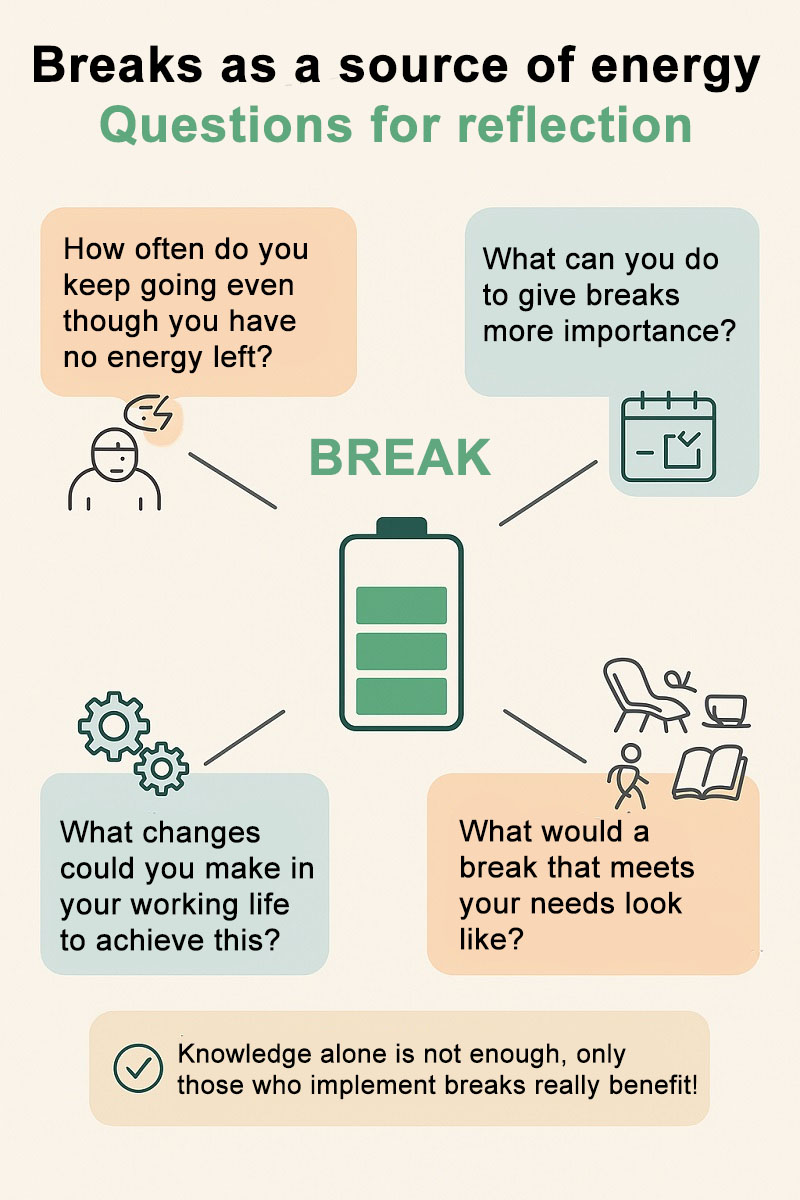Breaks: Underrated power tool or waste of time?
What do you think about taking breaks?
Are breaks a waste of time? Or are they a source of energy, true power tools in our everyday lives and in our jobs?
I think everyone knows how important breaks are. That we cannot power through endlessly without losing energy and suffering the associated negative effects on our performance, health and well-being.
And yet we often don’t behave accordingly.
I was talking to a project manager about breaks the other day. He told me, ‘I have a problem taking breaks. Especially when I’m really enjoying my work. I get so passionate about what I’m doing that I simply forget to take a break. Even though I know it’s not good for me.’
I could relate to that very well.
However, I don’t want to go into the inner programmes that prevent us from taking breaks in this article. Instead, I would like to tell you a story. A true story about a managing director who discovered the importance of breaks in a critical situation. And in doing so, saved his company from closure.
The background to the story
A few years ago, I was a member of a working group at GPM, the German Association for Project Management. This working group looked at the risks of burnout among project managers and conducted the largest GPM study on this topic to date. Almost 1,000 project managers took part. [1]
The results were clear: 37% of those surveyed were at high risk of burnout. After the study was published, we travelled across Germany to present the results in the various GPM regions. The main focus was on the internal and external risk factors that place particular strain on project managers and how these can be effectively countered.
I gave many of these presentations myself. One of them eventually took me to the Dortmund-Ruhr regional group. There I met an entrepreneur who told me an impressive story about taking breaks.
The true story of an entrepreneur who discovered the benefits of taking breaks
There were only a few of us who had gathered for my lecture that evening. Twelve people sat around the table. I presented the results of the study. Then we moved on to the discussion. After a few questions and answers, the entrepreneur spoke up and told us his story. It was about taking breaks.
He was the owner of a medium-sized company with around 30 employees. Business was good. There was sufficient demand and orders. The employees were motivated and there was a good working atmosphere. The entrepreneur had long and intense working days. Just as you would expect from a business owner in a medium-sized company.
Then there was a turning point in his life. He fell ill. His back was no longer working properly. The symptoms became increasingly severe. The pain increased. He could no longer work as before. His performance was extremely impaired. Naturally, his mental health also suffered: what would happen to his company?
This caused him great concern and weighed heavily on him. He knew that if things continued like this, he would have to close his business. All his employees would have to be laid off. The doctor told him he had to make a change in his life. But he didn’t have a concrete solution.
After several days and weeks of reflection, the entrepreneur made a radical decision: he reorganised his entire working day. A reset of his daily routine:
- He no longer worked more than 8 hours a day. A maximum of 4 hours in the morning and 4 hours in the afternoon.
- He prescribed himself a two-hour lunch break. Every day. During which he withdrew completely. He was not available.
A break to recharge his batteries. For the second part of his working day. I don’t know exactly what he did during this break. He said that he allowed himself plenty of rest.
Resetting his daily routine had a huge impact. The effects of his two-hour lunch break were particularly noticeable.
After sticking to the programme for two months, things started looking up again.
His strength and health improved. It increased from week to week.
- His well-being, energy and mood improved.
- He reported positive effects on his creativity and problem-solving skills.
- His performance returned. So did his confidence.
After three months, it was clear that he could continue running the company.
The impact on the working atmosphere
He maintained the structure of his daily work routine, including the two-hour break. He attributed the greatest effects to this break.
And there was more: the employees noticed what was happening. He became a role model for his employees, who now also took significantly more time for their breaks. This increased the productivity and morale of the employees.
The already good working atmosphere improved even further.
After the entrepreneur had told his story, there was silence in the room.
We were all deeply impressed and moved.
We sensed how much courage it had taken him to reset his daily work routine. And that this courage and his unwavering focus in implementing this solution had paid off in the end.
Breaks as a source of energy
With the story I just told in mind, I would like to turn your attention to your own personal working life.
- How often do you keep going even though you have no energy left?
- What can you do to give breaks more importance? What would you gain from doing so?
- What would a break that meets your needs look like?
- What changes could you make in your working life to achieve this?
The story of the entrepreneur clearly shows that if you want to benefit from the positive effects of a break, you have to put it into practice. Thinking about it and theoretical knowledge won’t help. Neither will waiting for someone else to give you the impetus.
We will examine our relationship with breaks and realign it. We will integrate breaks into our everyday lives in a way that suits our desires, needs and tasks.
In my opinion, breaks are the most underrated power tool for a fulfilling and successful job. The story of the entrepreneur illustrates this clearly and impressively.
I hope this story has inspired you to think about your relationship with breaks. Do you have a good, healthy relationship with breaks? Or do you consider breaks a waste of time? That would be a shame, because breaks are a source of energy, a creativity booster and a catalyst for growth.
Notes (partly in German):
Here you can find more information about the Inner Power Club. And here you can find a German-language behind the scenes video showing how a club member has integrated the concept of mini-breaks into her job and what effects this has had.
[1] GPM Know-how: Burnout-Gefährdung bei Projektmanagerinnen und Projektmanagern
‘How often do you take a break?’ asks Peter Fluehr in an article describing what you can learn from athletes for your projects.
If you like the article or would like to discuss it, please feel free to share it in your network. And if you have any comments, please do not hesitate to send us a message.
Martina Baehr has published more articles on the t2informatik Blog, including:

Martina Baehr
In the t2informatik Blog, we publish articles for people in organisations. For these people, we develop and modernise software. Pragmatic. ✔️ Personal. ✔️ Professional. ✔️ Click here to find out more.



